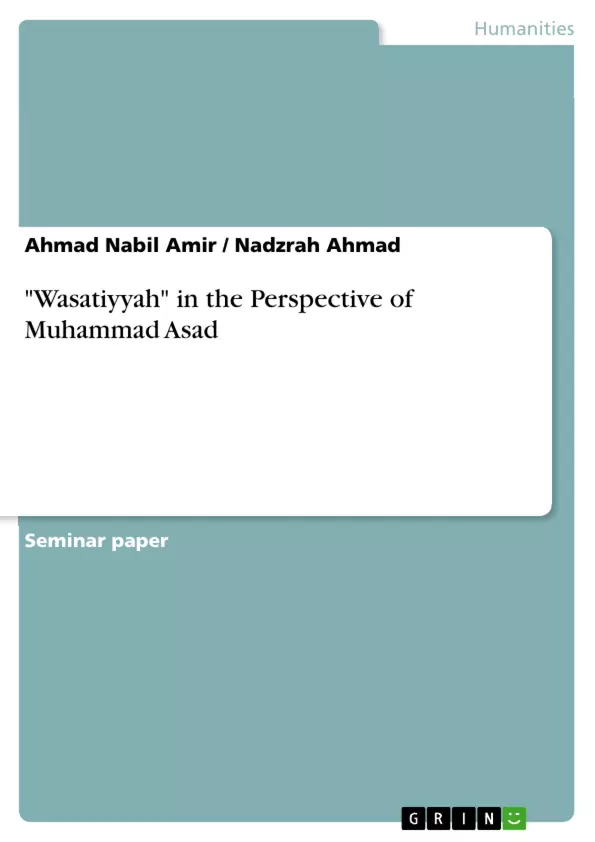This paper aims to analyze Muhammad Asad’s significant ideas and doctrine of "wasatiyyah" (Islamic moderation) as illustrated in his magnum opus "The Message of the Qur’an". It endeavors to discuss the essential idea and principle of moderate Islam or “community of the middle way” (ummah wasata) as interpreted and propounded by Asad (1900-1992) in his Tafsir. It will also analyzed other major works of Asad that presented his views and understanding of wasatiyyah such as The Road to Mecca – his auto-spiritual biography and travelogue, This Law of Ours and Other Essays, The Principles of State and Government in Islam, Islam at the Crossroads and Sahih al-Bukhari: The Early Years of Islam that further illustrated his analytical discussion of this important idea and its significant implications in Muslim society.
Inhaltsverzeichnis (Table of Contents)
- Introduction
- Some religious perspective on wasatiyyah
- Islamic principle of wasatiyyah from Asad's viewpoint
- The Islamic Governance in the context of Wasatiyyah
- Conclusion
Zielsetzung und Themenschwerpunkte (Objectives and Key Themes)
This paper examines the concept of wasatiyyah (Islamic moderation) as interpreted by Muhammad Asad, particularly through his magnum opus, The Message of the Qur'an. The paper explores Asad's fundamental principles of moderate Islam and analyzes his views on this important concept as articulated in his various writings.
- The essence and principles of wasatiyyah as understood by Asad.
- The role of wasatiyyah in shaping Asad's interpretation of the Qur'an and Islamic teachings.
- The implications of wasatiyyah for Muslim society and its relationship with non-Muslims.
- Asad's interpretation of the concept of "ummah wasat" (community of the middle way).
- The practical application of wasatiyyah in various aspects of Islamic life.
Zusammenfassung der Kapitel (Chapter Summaries)
The introduction discusses the significance of wasatiyyah in Muhammad Asad's worldview and provides a brief overview of the paper's objectives.
The following chapter explores different perspectives on wasatiyyah, drawing upon interpretations found in the Qur'an and Sunnah, as well as the insights of various Islamic scholars.
The subsequent chapter delves into Asad's understanding of wasatiyyah as articulated in his auto-spiritual biography, The Road to Mecca, and examines how he applies this principle in his interpretation of the Qur'an. This chapter focuses on specific passages in the Qur'an and analyzes Asad's commentary, highlighting his views on the balanced approach to life advocated by Islamic moderation.
Schlüsselwörter (Keywords)
The main keywords and focus topics of this paper include Muhammad Asad, wasatiyyah, Islamic moderation, ummah wasat, The Message of the Qur'an, The Road to Mecca, balanced community, and Islamic governance.
Frequently Asked Questions
What does "wasatiyyah" mean in Islam?
Wasatiyyah refers to Islamic moderation or the "middle way," avoiding extremes in religious practice and social life.
Who was Muhammad Asad?
Muhammad Asad (1900-1992) was a prominent Jewish-born Muslim scholar, diplomat, and author known for his English translation of the Qur'an, "The Message of the Qur'an."
What is the concept of "ummah wasata"?
Asad interprets this as a "community of the middle way," a balanced society that serves as a bridge between extremes and a witness for humanity.
How does Asad apply moderation to Islamic governance?
In his works, Asad argues for a state based on Qur'anic principles that ensures justice and balance without falling into authoritarianism or secularism.
What are Asad's major works besides his Tafsir?
Notable works include "The Road to Mecca," "Islam at the Crossroads," and "The Principles of State and Government in Islam."
- Quote paper
- Dr. Ahmad Nabil Amir (Author), Nadzrah Ahmad (Author), 2017, "Wasatiyyah" in the Perspective of Muhammad Asad, Munich, GRIN Verlag, https://www.grin.com/document/378653



